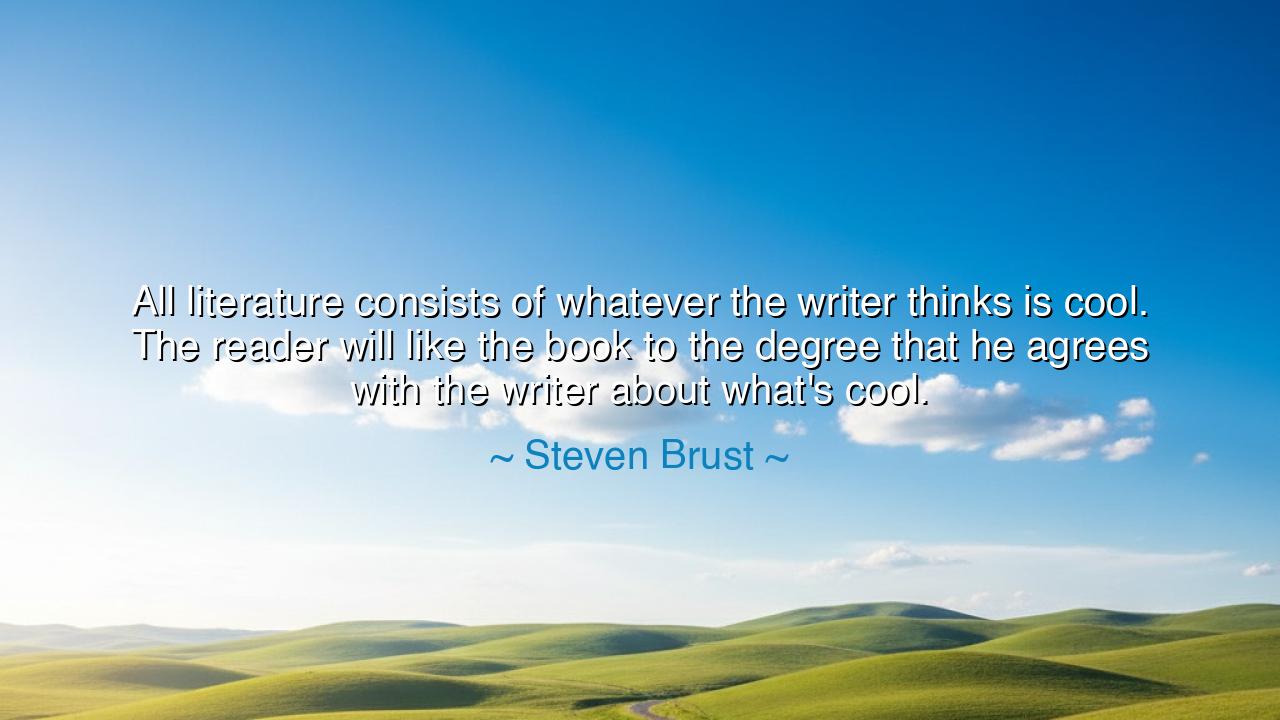
All literature consists of whatever the writer thinks is cool.
All literature consists of whatever the writer thinks is cool. The reader will like the book to the degree that he agrees with the writer about what's cool.






On the Communion Between Creator and Reader
When Steven Brust declared, “All literature consists of whatever the writer thinks is cool. The reader will like the book to the degree that he agrees with the writer about what's cool,” he offered a truth that pierces to the very heart of creation — that art, at its core, is a communion of taste, spirit, and vision. His words speak not of vanity or whimsy, but of the secret bond between the creator and the beholder, the spark that leaps from one soul to another when they recognize the same fire. To call something “cool,” in this ancient sense, is not to praise what is fashionable or fleeting, but to honor what stirs the blood — what awakens wonder, courage, or beauty within the heart.
For literature has never been born of rules or formulas. It arises from passion — from the writer’s conviction that certain things are worthy of attention, that certain ideas, characters, or moments are worthy of reverence. The writer, in truth, is not so different from the prophets or poets of old who spoke of what they loved and what they feared. The reader, then, becomes a kindred spirit when he feels the same thrill — when he too finds coolness, that is, meaning and vitality, in what the author has brought forth. In this way, all stories are bridges between souls: each book a meeting place where two minds agree, even if only for a fleeting instant, on what is worth celebrating in the vast landscape of human life.
This notion has echoed through the ages. Consider Homer, who sang of Achilles’ rage and Odysseus’ cunning because those were, to him, the highest forms of coolness — the heroic virtues of his world. His audience agreed, and for millennia his tales have endured. But when the values of the world changed, when people began to see beauty not only in warriors but in thinkers and dreamers, new voices arose — Shakespeare, who found “coolness” in the play of human emotion and irony; Jane Austen, who found it in wit and restraint; Toni Morrison, who found it in endurance and truth. Each spoke their vision of what was noble, interesting, alive — and those who shared their reverence heard the call and joined in the song.
To say that “the reader will like the book to the degree that he agrees with the writer about what’s cool” is to recognize that art is not a one-way transmission. It is not a sermon delivered to the passive, but a dialogue between two flames. The reader must bring his own sensibility, his own history of loves and dreams. A child who thrills at adventure finds kinship with Jules Verne or J.K. Rowling; a philosopher who adores paradox and rebellion finds himself in Nietzsche or Kafka. When the reader meets the writer in this space of mutual fascination, the work becomes more than ink — it becomes a mirror of shared humanity.
There is, too, a humbler wisdom in Brust’s words: that no artist can please all hearts, and no heart can love all art. The failure of connection is not failure of craft, but difference of vision. What one soul finds “cool,” another may find trivial or strange. Yet this diversity is the very essence of culture — the endless chorus of voices, each singing of what it loves. The greatest artists, then, are not those who chase approval, but those who remain true to their own sense of wonder, trusting that somewhere, someone will hear and understand. Authenticity, not popularity, is the mark of enduring art.
History teaches us this through the tale of Vincent van Gogh, who painted the world as he saw it — not as others wished it to be. To his contemporaries, his colors were too wild, his brush too fierce, his vision too personal. But to later generations, those very qualities became his genius. His “coolness” — the way he saw holiness in a sunflower and eternity in a star — found its readers and worshippers in time. So too with every artist who dares to reveal what they love, unfiltered and unashamed. The world may not understand them at first, but truth always finds its echo.
The lesson, then, is clear: create and live according to what you find cool — that is, what ignites your spirit and feels authentic to your nature. Do not shape your art, your words, or your life to fit the taste of others, for only what is born from sincerity endures. And as readers, seek works that resonate with your heart’s rhythm, that remind you of what you hold dear. In art as in life, connection comes not from imitation but from honesty — from daring to say, “This is what I love. This is what I find beautiful.”
Thus, in Steven Brust’s words, we discover not a theory of writing, but a philosophy of being. To create, to live, and to connect is to declare what we find meaningful, and to meet others who feel the same. The measure of great art is not universal approval, but the resonance it creates in those who share its vision. For when two souls agree on what is cool — on what is true, beautiful, and alive — they are, for that brief and shining moment, united in eternity.






AAdministratorAdministrator
Welcome, honored guests. Please leave a comment, we will respond soon